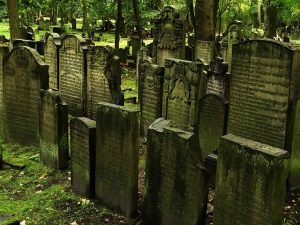 Where would you go if you needed a place to calm down? A park? A museum? Perhaps you are of the fortunates for whom a Beis Medrash is the greatest source of rejuvenation. But would anyone consider a cemetery a great place to wind down? Well, a pious man who lived more than 1,500 years ago did. You see, a pauper came knocking at his door. It was a year of famine, but this great tzaddik had compassion and gave some money to the pauper. The woman of the home, though, was not happy with the largesse and she let her husband know it. It’s not hard to understand her position, is it? After all, it was a famine year and they themselves must have been struggling like everyone else. In response to his wife’s harangue, the pious man decided to spend the night in the cemetery. Sounds too strange? Well, take a look in Brachos 18b and you can see for yourself. While in the cemetery, the Gemara continues, this pious man heard two spirits conversing about the Heavenly decrees for the upcoming year. With this inside information, the pious man was able to plan accordingly. While everyone’s crops suffered terribly that year, his did wonderfully.
Where would you go if you needed a place to calm down? A park? A museum? Perhaps you are of the fortunates for whom a Beis Medrash is the greatest source of rejuvenation. But would anyone consider a cemetery a great place to wind down? Well, a pious man who lived more than 1,500 years ago did. You see, a pauper came knocking at his door. It was a year of famine, but this great tzaddik had compassion and gave some money to the pauper. The woman of the home, though, was not happy with the largesse and she let her husband know it. It’s not hard to understand her position, is it? After all, it was a famine year and they themselves must have been struggling like everyone else. In response to his wife’s harangue, the pious man decided to spend the night in the cemetery. Sounds too strange? Well, take a look in Brachos 18b and you can see for yourself. While in the cemetery, the Gemara continues, this pious man heard two spirits conversing about the Heavenly decrees for the upcoming year. With this inside information, the pious man was able to plan accordingly. While everyone’s crops suffered terribly that year, his did wonderfully.
Now did this whole scenario really happen? Did the pious man really spend the night in a cemetery? The Maharsha says no. “It cannot be,” insists the Maharsha, “that a pious man would spend a night in a cemetery which is a place of tumah (ritual impurity). What the Gemara means is that he dreamt the whole thing. It was Rosh HaShana night – when dreams can carry much, much more significance than usual – and Heaven revealed to this pious man what was being decreed for the new year.”
Now let’s fast forward to Brachos 55a: “Said Rav Yehudah in the name of Rav, three things require heartfelt prayer: a good year, a good dream, a good king.” The Maharsha explains that this statement is in reference to Rosh HaShana. The “good year” part being the obvious tip-off. In light of the Maharsha’s explanation of the story of the pious man spending the night in the cemetery, we already know what the “good dream” part is about too: dreams on Rosh HaShana can carry a lot more weight, so when you say ha’mapil on the night of Rosh HaShana, have extra-special concentration. “And the part about a good king,” elaborates the Maharsha, “is also directly related to Rosh HaShana. On the day that He expresses his sovereignty over the world, Hashem determines who the world leaders shall be.” As Chazal tell us (also in Brachos, 58a, and it comes with a fascinating story – take a look): earthly monarchy reflects Heavenly Monarchy.
In both Israel and the USA we just had two exceedingly significant elections. Not even two months after Rosh HaShana…
Now, before you jump to any erroneous conclusions about what I’m trying to say, let me make one point clear: in no way am I trying to imply that there’s no point in casting your ballot. Our Torah leaders throughout the generations have taught us that shtadlanus – making every effort in the realm of political activism to better our lot – is a genuine Jewish value. We can only ask Hashem for help when we do what is in our power to help ourselves.
That being said, such weighty elections can (and should) underscore for us the need for fervent prayer. Both global and domestic affairs have become more volatile and polarized as time moves forward. It’s only reasonable, then, to have a heightened sense of urgency in asking Hashem to provide for a good leader. Including that whatever leaders are chosen indeed turn out to be good for the Jews and the world as a whole. After all, we Yidden are the title-holders of the world’s most super-fortunate people. Even when politicians and pundits alike are up-in-arms trying to make sense of a topsy-turvy world, we take great encouragement in knowing that, ultimately, “the heart of the king is in the hand of Hashem[1].”
[1] Mishlei 21:1
